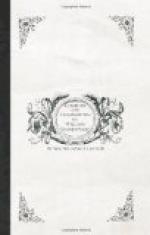This wholesome reproof did bring the youth back again to his right senses; and then said he, with contrition, and with a wisdom beyond his years, and little to be expected from one who had spoken just before so unadvisedly and rashly, —
“Well do I know it, your worship! And verily do I believe that a bone of one being shovelled among the soil upon his coffin would forthwith quicken {8a} him. Sooth to say, there is ne’er a buckhound in the county but he treateth him as a godchild, patting him on the head, soothing his velvety ear between thumb and forefinger, ejecting tick from tenement, calling him ‘fine fellow,’ ‘noble lad,’ and giving him his blessing, as one dearer to him than a king’s debt to a debtor, {8b} or a bastard to a dad of eighty. This is the only kindness I ever heard of Master Silas toward his fellow-creatures. Never hold me unjust, Sir Knight, to Master Silas. Could I learn other good of him, I would freely say it; for we do good by speaking it, and none is easier. Even bad men are not bad men while they praise the just. Their first step backward is more troublesome and wrenching to them than the first forward.”
“In God’s name, where did he gather all this?” whispered his worship to the chaplain, by whose side I was sitting. “Why, he talks like a man of forty-seven, or more!”
“I doubt his sincerity, sir!” replied the chaplain. “His words are fairer now—”
“Devil choke him for them!” interjected he, with an undervoice.
“—and almost book-worthy; but out of place. What the scurvy cur yelped against me, I forgive him as a Christian. Murrain upon such varlet vermin! It is but of late years that dignities have come to be reviled. The other parts of the Gospel were broken long before,- -this was left us; and now this likewise is to be kicked out of doors, amid the mutterings of such mooncalves as him yonder.”
“Too true, Silas!” said the knight, sighing deeply. “Things are not as they were in our glorious wars of York and Lancaster. The knaves were thinned then,—two or three crops a year of that rank squitch-grass which it has become the fashion of late to call the people. There was some difference then between buff doublets and iron mail, and the rogues felt it. Well-a-day! we must bear what God willeth, and never repine, although it gives a man the heart-ache. We are bound in duty to keep these things for the closet, and to tell God of them only when we call upon his holy name, and have him quite by ourselves.”
Sir Silas looked discontented and impatient, and said, snappishly, —
“Cast we off here, or we shall be at fault. Start him, sir!— prithee, start him.”
Again his worship, Sir Thomas, did look gravely and grandly, and taking a scrap of paper out of the Holy Book then lying before him, did read distinctly these words:-
“Providence hath sent Master Silas back hither, this morning, to confound thee in thy guilt.”




